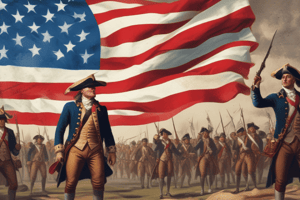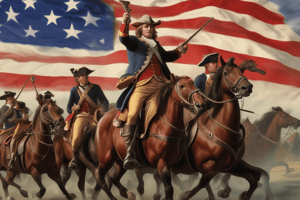Podcast
Questions and Answers
What was the primary outcome of the Seven Years War between Britain and France?
What was the primary outcome of the Seven Years War between Britain and France?
- France gained dominance in the world
- Britain gained dominance in the world (correct)
- The war led to the formation of the United States
- The war ended in a stalemate
What was the main reason behind the colonists' resentment towards the British government?
What was the main reason behind the colonists' resentment towards the British government?
- The British government restricted their right to bear arms
- The British government imposed taxes on them without giving them representation in Parliament (correct)
- The British government did not allow them to trade with other countries
- The British government did not allow them to practice their own religion
What event in 1770 saw British soldiers kill five men?
What event in 1770 saw British soldiers kill five men?
- The Boston Tea Party
- The Battle of Lexington and Concord
- The Continental Congress
- The Boston Massacre (correct)
What was the significance of the first Continental Congress in 1774?
What was the significance of the first Continental Congress in 1774?
Who was the commander-in-chief of the Continental Army?
Who was the commander-in-chief of the Continental Army?
What was the significance of the Battle of Bunker Hill?
What was the significance of the Battle of Bunker Hill?
When was the Declaration of Independence adopted?
When was the Declaration of Independence adopted?
What was the main reason behind the colonists' desire for independence?
What was the main reason behind the colonists' desire for independence?
What was the significance of the Tea Act of 1773?
What was the significance of the Tea Act of 1773?
Flashcards are hidden until you start studying
Study Notes
The American Revolution
- The American Revolution was a significant event in history, leading to the formation of the United States, a country with immense economic and military power.
- The revolution's causes, such as liberty, representation, freedom, and independence, laid the foundation for social democracies in the following centuries.
Causes of the Revolution
- The Seven Years War (1756-1763) between Britain and France led to Britain's dominance in the world, but also resulted in new and unpopular taxes.
- The British government imposed taxes on the colonies, including the Stamp Act of 1765, Townsend Acts of 1767, and Tea Act of 1773, without giving them representation in Parliament.
- Colonists felt these taxes were unfair, leading to growing resentment and protests.
Events Leading to War
- The Boston Massacre in 1770 saw British soldiers kill five men, and the Boston Tea Party in 1773 saw colonists dump 342 chests of tea into Boston Harbor, further increasing resentment.
- The first Continental Congress met in 1774, including delegates like George Washington, John Adams, and Samuel Adams, demanding the rights of citizens, including life, liberty, property, assembly, and trial by jury.
The Revolutionary War
- The first battle of the Revolutionary War took place on April 18, 1775, at Lexington and Concord, where British soldiers clashed with colonial militiamen.
- The Second Continental Congress met in the summer of 1775, voting to raise a Continental Army with George Washington as commander-in-chief.
- The Battle of Bunker Hill in Boston was a British victory, but it gave encouragement to the colonial forces.
- The Declaration of Independence was adopted on July 4, 1776, asserting the right to choose their own government and stating that all men are created equal.
Turning Points and Key Battles
- The American victory at Saratoga in 1777-78 led to France entering the war on the colonists' side, making it an international conflict.
- Washington's forces rallied in the north, while the south suffered setbacks, including Benedict Arnold's defection to the British.
- The British occupied Georgia and Charleston, South Carolina, but were eventually trapped and forced to surrender at Yorktown in 1781.
Aftermath and Legacy
- The Treaty of Paris was signed in 1783, recognizing the independence of the United States.
- The American Revolution's influence can be seen in the rights enshrined in the Declaration of Independence and the US Constitution.
- The revolution marked the triumph of new ideas over entrenched monarchical systems, leading to the birth of a new kind of politics and thinking.
The American Revolution
- The American Revolution led to the formation of the United States, a country with immense economic and military power.
Causes of the Revolution
- The Seven Years War between Britain and France led to Britain's dominance in the world, but also resulted in new and unpopular taxes.
- The British government imposed taxes on the colonies without giving them representation in Parliament, including the Stamp Act of 1765, Townsend Acts of 1767, and Tea Act of 1773.
- Colonists felt these taxes were unfair, leading to growing resentment and protests.
Events Leading to War
- The Boston Massacre in 1770 saw British soldiers kill five men.
- The Boston Tea Party in 1773 saw colonists dump 342 chests of tea into Boston Harbor, further increasing resentment.
- The first Continental Congress met in 1774, including delegates like George Washington, John Adams, and Samuel Adams, demanding the rights of citizens.
The Revolutionary War
- The first battle of the Revolutionary War took place on April 18, 1775, at Lexington and Concord.
- The Second Continental Congress met in the summer of 1775, voting to raise a Continental Army with George Washington as commander-in-chief.
- The Battle of Bunker Hill in Boston was a British victory, but it gave encouragement to the colonial forces.
- The Declaration of Independence was adopted on July 4, 1776, asserting the right to choose their own government and stating that all men are created equal.
Turning Points and Key Battles
- The American victory at Saratoga in 1777-78 led to France entering the war on the colonists' side.
- Washington's forces rallied in the north, while the south suffered setbacks, including Benedict Arnold's defection to the British.
- The British occupied Georgia and Charleston, South Carolina, but were eventually trapped and forced to surrender at Yorktown in 1781.
Aftermath and Legacy
- The Treaty of Paris was signed in 1783, recognizing the independence of the United States.
- The American Revolution's influence can be seen in the rights enshrined in the Declaration of Independence and the US Constitution.
- The revolution marked the triumph of new ideas over entrenched monarchical systems, leading to the birth of a new kind of politics and thinking.
Studying That Suits You
Use AI to generate personalized quizzes and flashcards to suit your learning preferences.





